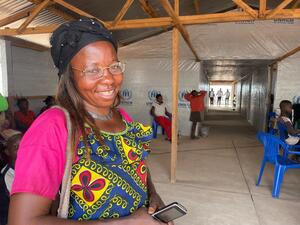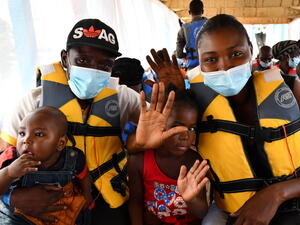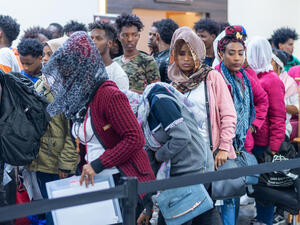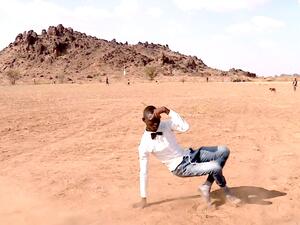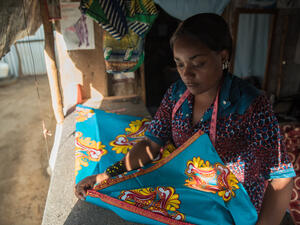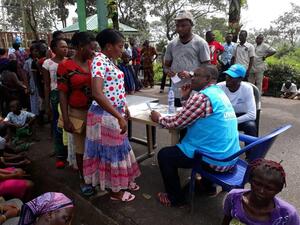Sudanese refugees sharpen their skills as they prepare to return home
Sudanese refugees sharpen their skills as they prepare to return home
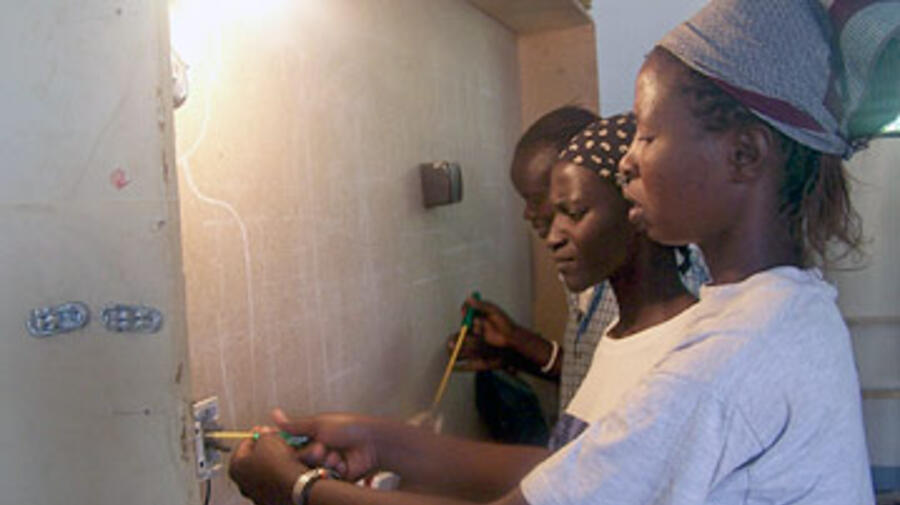
In Kakuma camp, refugees are being trained in a range of professions, including as electricians.
KAKUMA CAMP, Kenya, October 26 (UNHCR) - In the scorching heat of Kakuma refuge camp, in north-west Kenya, Sudanese refugees are upbeat about returning home. The majority of them have been living in this camp for more than a decade. Most of the children have never set foot in their home country. They only hear about Sudan from stories repeated by their parents and older brothers and sisters.
"My family come from Bor County in South Sudan," says 11-year-old Nywon Pal. Nywon's family left South Sudan in 1993 following increased fighting in the Bor region. Nywon was born a year later in Kakuma camp and has, to this day, never been to Sudan. Today, he and his family are among the Sudanese refugees who have registered with UNHCR to go home.
Also ready to repatriate is 22-year-old Isack Mayen. Mayen came to Kakuma from the Bar-el-Gazal region in 1995 with his only brother, Michael Milwa. However, Milwa was killed by an unknown assailant who they suspect came from Sudan, leaving behind his 19-year-old wife Malwal and their 2-year-old daughter. According to Dinka traditions, as their father was killed by the Sudanese army in 1994, the responsibility for taking care of his brother's family now falls on Mayen. Mayen feels that the conditions in Kakuma refugee camp are not suitable for bringing up his brother's young family properly, and starting his own family.
"We have no source of income here apart from what we are given by UNHCR," says Mayen who dropped out of school at the lower primary level. "If there is really peace, I will get a job and support my family."
More than 1,200 Sudanese refugees in Kakuma have registered to repatriate with the UN refugee agency. A good number of the refugees believe that life would be better at home compared to in Kakuma camp. The camp, which was opened in 1991, covers an immensely long strip - 15 km long by 1 km wide. It hosts more than 90,000 refugees, including Somalis, Ethiopians, Eritreans, Burundians, Ugandans and Congolese. The place is very arid, and not conducive to agricultural production.
Daniel cannot wait to go back. He is currently working as a health volunteer with the International Rescue Committee (IRC). Daniel hopes that he will be able to find employment with one of the NGOs currently working in South Sudan. Daniel, who is 26 years old, views going back to Sudan in terms of moving to greener pastures.
"You go where there is rain so that you can cultivate and eat," he says. "Here there is no rain."
Before coming to Kakuma four years ago, Daniel worked as a volunteer community health worker in Sudan, after taking a nine-month course in health education. The Sudan People's Liberation Movement (SPLM) was running health programmes in many areas of South Sudan, and they were employing volunteers like Daniel to create awareness of health issues. "The problem is that they did not have money to pay us," says Daniel. He hopes that this time he will get a salary.
Going home after many years in a refugee camp can involve enormous personal adjustments. The UN refugee agency has started preparing Sudanese refugees for the repatriation from Kakuma, which is scheduled to begin before the end of the year. It will definitely be a big challenge for the refugees to go home and start life afresh having grown accustomed to free food, medical services and education in the camp. Refugee rights have also been emphasized by UNHCR and its partners during the 14 years of the camp's existence. Women, in particular, have been very concerned about whether they will continue to enjoy the same rights when they are back in Sudan. In Kakuma, women and girls are encouraged to make their own decisions, and have grown used to doing so.
With the support of the Kenyan government, UNHCR is currently running a teacher-training programme which is going to benefit more than 400 refugee teachers, who have been teaching in the camp without having ever undergone any formal training. The curriculum is tailored to upgrade their teaching skills. Lack of teachers in South Sudan remains a big challenge.
"The only way we can encourage southern Sudanese to go back home is by making it possible for them to get education at home," says the head of UNHCR's Office in Kakuma, Cosmas Chanda. "The Sudanese are very thirsty for education." The first group will complete the teacher-training course in 18 months, after which they will repatriate to Sudan.
UNHCR, together with Italian NGO Don-Bosco, is also concentrating on other types of skills development. Refugees are trained on computers, and how to do carpentry, electrical work, plumbing, motor engineering and agricultural science. Those who qualify are then seconded to institutions in Kenya to gain further experience.
UNHCR is also carrying out other activities, including a mine-awareness programme in conjunction with Handicap International. This programme seeks to train refugees returning to mine-affected territories in southern Sudan to be able to manage mine-related risks. Handicap International estimates that more than 5 million landmines have been sown in South Sudan, mainly close to roads, water sources and garrisons. More than 5,000 people with disabilities currently live in Kakuma, the majority of them Sudanese who have been victims of landmines.
"Without providing thorough education on risks associated with landmines, the repatriation process will be very complicated," says Chanda. "We have to prepare them well enough to return to their grazing lands and farms which in many cases are contaminated with landmines."
Other preparatory activities include HIV/Aids awareness programmes being run by the International Rescue Committee (IRC). It is hoped that refugees who have gone through such programmes will be the agents of change when they return to Sudan. They will be able to create wider awareness on HIV/Aids in their home areas.
In South Sudan, UNHCR and other agencies are working hard, preparing for the return of the refugees. Activities include building water sources, construction of clinics, rehabilitating hospitals and working with other agencies to protect the rights of returnees. The needs of this war-shattered region are immense.
The irony of all this is that even as some refugees register with UNHCR to go back home, a number are still coming in from South Sudan to Kakuma refugee camp. Since the signature of the peace deal on January 9 this year, more than 6,000 Sudanese have come to the camp. Most of them are complaining about hunger, lack of education and poor medical services in Sudan. Opeiw Ojulu, aged 22, arrived in Kakuma three weeks ago from Pochala in South Sudan. He spent five days walking from Pochala to Narus, and then hitch-hiked and found a car to take him to Lokichoggio, a border town between Kenya and Sudan.
"People are suffering," said Opeiw as he helped other new arrivals construct their new houses. "There is no food, no hospitals and no schools." Opeiw is nevertheless optimistic that he too will go back to Sudan soon. "If the conditions in South Sudan improve, then I will go back."
In August, UN High Commissioner for Refugees António Guterres, during a visit to Kakuma camp, assured the refugees that the UN agency will remain there until every body returns home safely in dignity.
By Emmanuel Nyabera in Kakuma Camp, Kenya

